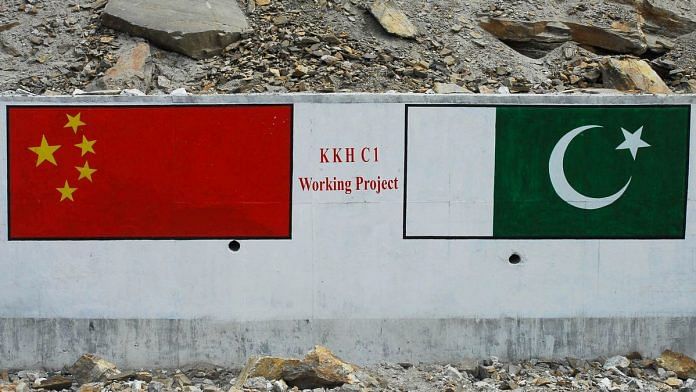Pakistan’s problem goes beyond macroeconomic issues. The cost of the China-Pakistan Economic Corridor has become more expensive than expected.
Pakistan’s government has finally admitted it needs help. Finance Minister Asad Umar says he will be meeting officials of the International Monetary Fund on the sidelines of its annual meeting Bali this weekend. There he’ll try and work out the terms for a bailout that would cover a $10 billion hole in Pakistan’s financing needs.
The decision has to be a little humiliating for new Pakistani Prime Minister Imran Khan — an anti-Western firebrand who’s had to turn to the West for help just like virtually every other Pakistani leader before him. More importantly, the process is likely to be a window into what’s wrong with China’s globe-spanning Belt and Road infrastructure initiative.
On the one hand, this is a familiar situation: Pakistan has had to seek bailouts 10 times since 1990 and still owes money from the last time it needed a handout. Khan was wise to approach the IMF early enough in his tenure that he can blame the previous government and accuse it of mismanagement.
Pakistan’s problem isn’t only poor macroeconomic stewardship, however. It’s the deals the preceding administration struck with China. A few years ago, Chinese President Xi Jinping promised to invest $60 billion into Pakistan’s economy. Since then, Pakistanis have hoped Chinese money would fund the power and transport infrastructure that could jump-start growth.
Building the China-Pakistan Economic Corridor — often hailed as the most crucial leg of the Belt and Road — has proved to be more expensive than expected. Machinery imports for Chinese projects caused Pakistan’s current account deficit to rise by over 50 percent in the first two years of the CPEC build-out. Islamabad has struggled to pay for all this and probably can’t expect more help from China: Beijing has been generous enough already, lending Pakistan $5 billion in 2017-18 and putting in an emergency $1 billion this summer when the country was staring once again at empty coffers.
If CPEC operated on straightforwardly commercial terms, none of this would be a problem. Then the projects would be remunerative for Pakistan. The IMF might demand some mild adjustment to their payment schedules and other parameters, and business could continue. The Fund’s likely other bailout terms — devaluing the currency, privatizing the state airline, hiking interest rates and implementing long-delayed structural reforms — would probably hurt a lot more.
But nobody expects that to be the case. In fact, it’s likely that CPEC’s costs to Pakistan are much higher than would make sense for the projects in question. Worse, currently these costs are opaque and some are hidden by the security establishment behind a veil of secrecy.
The IMF doesn’t operate like that; it will expect to be told, transparently, what the actual costs are for CPEC projects. That’s the point at which Khan’s backers in the military will begin to worry, because if the terms are as ruinous as suspected, support for CPEC — and, by extension, for China’s paramountcy in Pakistan — will wither. Worse, the IMF may withhold some aid: Senior US officials have already said any bailout shouldn’t lead to Western taxpayers paying off Chinese bondholders.
It’s an open question what Khan himself will pick, if he’s then forced to make a choice between staying the course with CPEC and financing his own grandiose new welfare schemes. But the lesson for Pakistan’s leaders — and, indeed, all those looking to China to rescue them from the pesky demands made by Western finance — runs deeper.
It may seem simpler at first to take advantage of Chinese money that doesn’t demand countries carry out painful investment-friendly domestic reforms if they want to borrow money. But without structural changes of the sort that lenders like the IMF demand — and which Pakistan, for one, has constantly postponed — crises such as the one Islamabad now faces are inevitable. Pakistan needs to reform so that its producers and exporters thrive. Unless these enterprises succeed, CPEC can’t be paid for and, even if it gets built, it will provide few benefits to ordinary Pakistanis.
As for China, this is a moment to step back and realize that the Belt and Road as currently envisaged isn’t working as planned. Cost escalations, hidden charges and other nasty surprises have soured one country after another on Chinese-led infrastructure. Worse, Beijing simply isn’t willing to commit enough resources to play lender of last resort for the countries that the BRI might drive towards default.
As a consequence, more countries that China sought to bring within its own sphere of influence are likely to be pushed away — and to turn again to the West for help. I suspect this isn’t where Chinese President Xi Jinping hoped his new Silk Road would lead. –Bloomberg




PM Imran Khan’s “ grandiose new welfare schemes “ will not see the light of day. Many years ago, Z A Bhutto had said he wanted each Pakistani to drive to work in a Mercedes. 2. Pakistan’s unreformed, tax non compliant economy and the onerous terms on which CPEC is being financed are proving to be a One, two punch. Each is a separate problem, needs solutions. Taken together, they become lethal. 3. There is now sufficient material available for China to review the viability of its BRI. Instead of winning friends, even clients, it is creating unsustainable debt loads. When the defaults start, as happened with Sri Lanka, both sides will get hurt. China itself faces unanticipated problems, largely due to the trade war with the US. 4. For Pakistan, this is no longer about a dominant military vs a weak civilian government. As Shri Shekhar Gupta explained yesterday, the country is slipping on economic well being for a generation, most noticeably against India, it needs to get its act together.